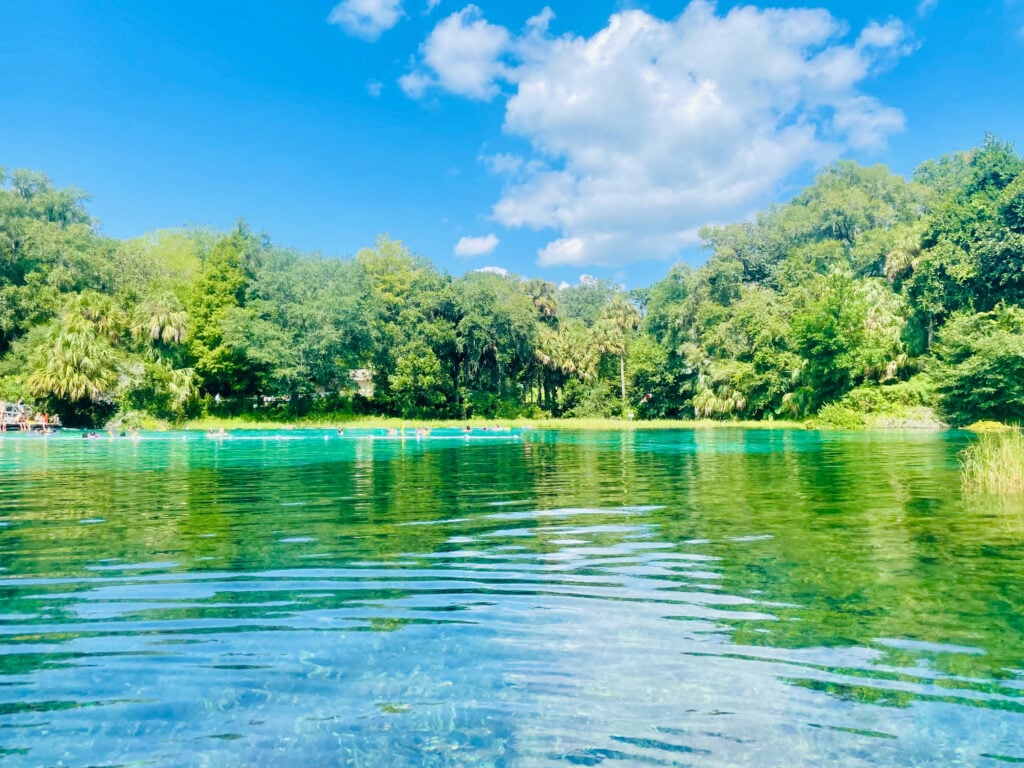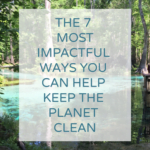10 Ways to Keep the Environment Clean
Keeping the environment clean is vital for the health of humans and animals, nature’s biodiversity, economic well-being, and our overall quality of life. Plus, clean surroundings are much more beautiful to enjoy! Here, you’ll find 10 ways to keep our environment clean and safe.

As a lifelong environmentalist and nature lover, I’ve written dozens of articles on protecting our natural resources. It’s a passion, but also a necessity. Humans have fallen out of balance with nature. I believe part of that reason is because we’ve become disconnected from the natural world, mostly due to our addiction to screens.
The other part is – giant corporations pollute the environment and then gaslight everyday people into thinking it’s their fault. That’s why you’ll find one of the tips below has to do with getting loud when it comes to your local elected officials.
How to Keep the Environment Clean
I’m not blaming it all on corporations. If we weren’t constantly consuming, there would be less demand on the businesses that do the polluting. We do play a role in consumption, ethical standards, and maintaining a clean environment. So, most of these tips are things you can do within your own home and family to reduce the burden.
And as always, don’t stress yourself out. There’s no medal for being a green guilt martyr. Do what feels right for you and your family. If we all take just a few of these actions, we can make a huge impact.
Here are 10 steps – big and small – you can take to keep our environment clean and safe.
1. Refuse single-use items
Straws, to-go cups, disposable razors, and plastic grocery bags are some ubiquitous examples of single-use products in our economy. Finding a reusable option for these items we use once and toss is a simple way to make a big difference.
While replacing all single use products with reusable products is best, it can be overwhelming at first. To get started, consider whether the product will be used for more than an hour. If the product’s useful life is less than an hour (straws, takeout containers, plastic bags…), try replacing it with a more sustainable alternative.
One of the best ways to avoid these products is to refuse them before they enter your life. This is how you vote with your dollar. Take the Buy Nothing New Challenge at least once a year. Unsubscribe from mailing lists and catalogs, bring your own bag, order a drink with no straw, and decline unnecessary receipts.
You’ll notice this article doesn’t focus much on recycling. The most important of the 3 R’s (reduce, reuse, recycle) is REDUCE. The fewer items you consume, the less there will be to dispose of. And much of the plastic you place in your recycle bin never actually gets recycled.
All that said, there are certainly things you can repurpose and recycle at home. Whatever you can do to lessen the amount of trash will always be worthwhile.
And don’t support fast fashion. Brands like Shein, Temu, Zara, Forever 21, Mango, and H&M are cheap for a reason. I spent nine years in the apparel industry. If someone tries to tell you their $5 t-shirt was made by fairly paid workers and with sustainable manufacturing processes, they are either misinformed or lying.
These cheap clothing brands also promote overconsumption. Consignment and thrift stores are overflowing with dresses that were worn once by someone who can’t be seen wearing the same thing twice on their Instagram. This does, however, make secondhand shopping a great option when you’re trying to lighten your environmental impact.
2. Buy locally and grow more of your own food
When shopping, focus on purchasing locally grown products rather than imported goods. Buying locally means less transportation, processing, and packaging. And when it comes to food – local means fresh… which tastes so much more flavorful.
Join your local CSA and shop at the farmer’s market when you can. Look for farms that practice regenerative agriculture and support their efforts to heal our soils and produce food that is actually more nutrient-rich. When you purchase meat, buy it from a reputable and ethical source without hormones or antibiotics.
Try your hand at gardening with the 10 Easiest Vegetables to Grow from Seeds. You won’t have to make as many frequent trips to the market if you plant vegetables and fruit trees in your very own backyard. Gardening with kids is a wonderful way to teach kids where their food comes from.
3. Compost your food waste
Twenty percent of landfill waste is food. Composting reduces the volume in our landfills. Municipal solid waste buried in a landfill doesn’t get enough oxygen and will produce methane.
Because compost is exposed to oxygen (by turning it or through the use of worms), it produces carbon dioxide instead of methane. Remains of plants and kitchen waste make rich nutrient filled food for plants, helping them grow faster. Instead of throwing away food, you can use it for the plants in your garden. Find out how to start a compost pile.
4. Dial down your thermostat
Adjusting your thermostat can help you use less energy for heating or cooling your home. When you lower your thermostat in the winter or raise it in the summer, your heating and cooling systems run less frequently, which means they consume less energy.
Switching to a programmable thermostat can also reduce your energy consumption. Set a schedule that runs your heat or air less during the times when no one is home. A smart thermostat can connect via an app on your phone, so you can even change the schedule when you’re out of town.
An adjustment of one or two degrees won’t make a huge difference in your comfort, but it can result in a nice savings on your electric bill. Get the kids involved with an energy checklist.
5. Plant trees and landscape with native plants
Green living areas in our cities and suburbs are vital for our planet’s health. And green spaces are essential for our mental health, according to a huge Danish study.
Industrialization and suburban sprawl have taken away the trees – our main source of unadulterated oxygen. They’re also beautiful, and they do their part to keep our environment clean.
By planting a tree today, you can make green space and unadulterated oxygen a reality for our kids. The same goes for landscaping with native plants. Not only are they low maintenance, they conserve water, reduce carbon pollution, don’t require as much fertilizer or pesticides, and support the health of local wildlife. If you don’t have your own lawn, you can donate a tree.
6. Use your car less
As much as 90% of road transportation in the U.S. is dependent upon oil. When you walk, bike, carpool, or take public transportation, you reduce your carbon footprint significantly.
If you must drive, try to get out at less busy times of day to avoid sitting in traffic wasting gas. And try to consolidate your outings. See how many separate trips you can prevent (this also saves time).
When it’s time to replace your vehicle, see if electric or hybrid is within your budget. Be sure to factor in the gas savings as you calculate pricing.
When it comes to vacations, opt for local destinations. Why not see all the beautiful natural resources your own town or state has to offer? If you must travel by air, choose a direct flight to help reduce emissions.
7. Conserve water
With industries dumping waste into our water supplies, our access to fresh, clean drinking water is dwindling. Running taps, taking long showers, running the dishwasher half-full, and unchecked water leaks examples of unnecessary water waste.
Try rainwater harvesting in buckets or a rain barrel which can be used to water your garden, landscaping, or lawn. You can even use collected rain water to wash your car.
- Encourage a little healthy competition among your family members to see who can take the quickest shower.
- If you have an efficient dishwasher, use it rather than hand washing dishes. And if you hand wash, don’t leave the water running unnecessarily.
- Turn off the tap when brushing your teeth.
- Install a dual flush or low flow toilet.
- Fix any leaks.
- Use a rain barrel to collect rainwater for outside watering.
- Only run the washing machine with a full load.
- Same goes for the dishwasher, despite the detergent commercials telling you to run it whether it’s full or not or even “after a snack.” Their goal isn’t to save water, it’s to sell more dishwasher detergent.
8. Tell your representatives you care about environmental policies
Your state and local representatives need to hear from you. Never doubt – they’re hearing from special interest groups and big businesses with big pockets.
There are several steps we can take in our individual lives, but let’s face it… your home can’t possibly pollute or waste resources on the same scale as a large factory or corporation.
Here are a few ways you can voice your concerns and ask that corporations are held to standards that protect our planet and keep our environment clean and safe:
- Attend your city council meeting.
- Find out who your Representatives and Senators are. Go to their websites, sign up for their newsletters, find out where they stand on issues you care about.
- Take a look at Get Involved: Index of Organizations, a list of nonprofit organizations, by topic, that are working to create fundamental change by educating the public and engaging citizens in grassroots initiatives.
9. Reduce chemical use & properly dispose waste
Many industries dispose of toxic waste (oil, paint, ammonia, and other harmful chemicals) openly. This is hazardous to water and air as these chemicals are soaked into the groundwater.
One of my family members works in water management along the Ohio River. There are regulations limiting what is allowed to be dumped in the river, but it appears many companies are not following these rules. He said that if you go by the allowed chemical rules, you couldn’t scoop a cup of water out of the Ohio River and legally dump it back into the Ohio River. That’s how polluted just one cup of water is.
When all of these chemicals combine, it’s no wonder cancer rates have skyrocketed. Support regulations and incentives for companies to keep our environment clean. And conventional agriculture is also a known polluter when it comes to chemical runoff.
As individual citizens or families, we can’t control what corporations do. But that’s where the step above comes in. Contact your representatives. And try your best not to patronize brands and companies that contribute to water or air pollution.
And when it comes to your own back yard, avoid over-fertilizing to make sure you’re not contributing to algae blooms from runoff. This is one of the biggest ways you can contribute to a clean environment.
Choose natural cleaning methods, environmentally-safer paints, and recycled or nontoxic home improvement materials to keep your indoor air cleaner (and naturally fresh) and your waste less harmful.
10. Fall in love with Mother Nature
“There is mounting research that supports the idea that children [and adults] who spend regular time playing and learning in the natural world are happier, healthier, smarter, more creative and better problem solvers,” shares Janice Swaisgood, Children & Nature Network’s National Coordinator of Nature Clubs for Families.
Essentially if we want to be inspired to protect our natural resources, we must fall in love with nature. Go out and wade in a spring, swim in a lake, and walk or play on the beach. Put down your phone, and go outside to see what kind of birds and butterflies are fluttering about your yard.
When you find a bird nest and observe (not interfere) with the hatching, growing, and finally flying away… you develop an intrinsic vested interest or ownership in the natural world.
If you have kids, get them OUTSIDE every day. Here are some fun ways to engage them with nature:
Nature Scavenger Hunt
DIY Organic Bird Feeder
Backyard Bug Count Activity
Create a Wildlife Garden
Stargazing with Kids
Keeping the Environment Clean FAQs
The ten most impactful ways to keep the environment clean are to refuse single-use items, buy more of your food locally or grow it yourself, compost your food waste, dial back your thermostat to save energy, plant trees and landscape with native plants, use your car less, conserve water, reduce chemical use, tell your representatives you care about environmental issues, and nurture your own connection with Mother Nature.
Keeping the environment clean is vital for human health, biodiversity, climate change mitigation, sustainable resource management, economic well-being, and our overall quality of life.
For decades, the U.S. shipped the bulk of its recycling to China, but they stopped accepting mixed paper and most plastics in 2018.
National Geographic reports that 91 percent of plastic doesn’t actually get recycled. Most plastic you place in your recycle bin is actually downcycled, meaning it gets less useful and more flimsy each time.
Recycling is not the most helpful step of the 3 R’s (reduce, reuse, recycle). The most important step is REDUCE. The fewer items you consume, the less there will be to dispose of.
Protecting our environment benefits everyone by promoting health, preserving nature, stabilizing our climate, enhancing our quality of life, and fulfilling our ethical duty to protect the planet for ourselves and future generations.
Remember – don’t let this list overwhelm you. Choose what feels fun or doable. Once you get the hang of that step and start to see the benefits, try another.
Which steps have you already taken? Did you find any new ones that feel right for your home or family? Let us know in the comments how you’re taking action for a clean environment.


